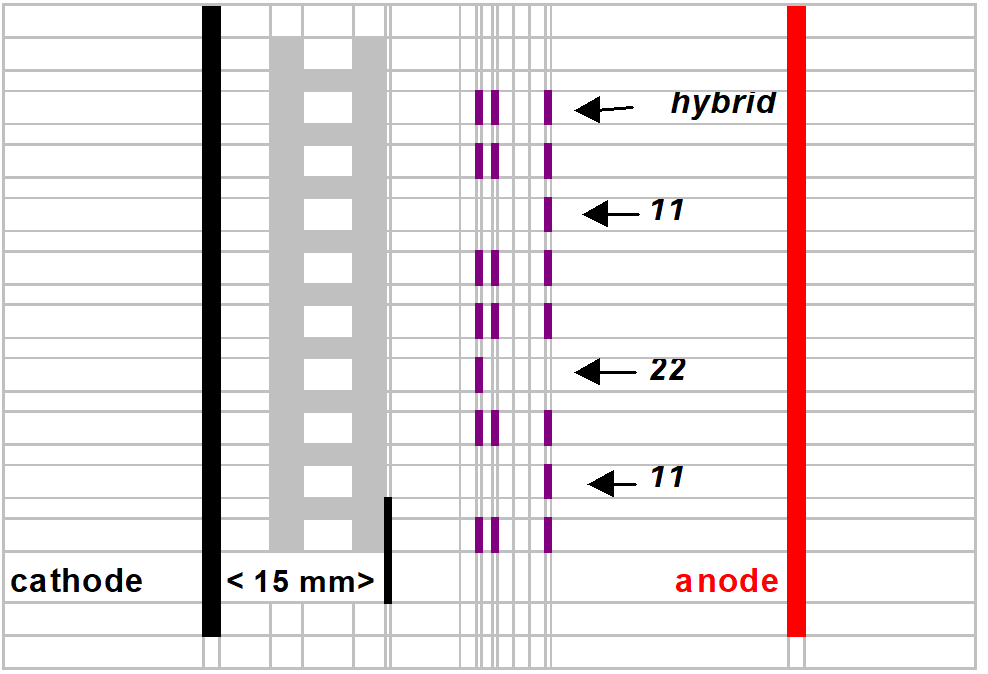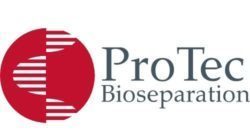
Pepper
DIA-I (Diaphorase)
16 % v/v glycerol
Bring 200 grams (= 160 ml) of glycerol (Sigma G-7757) and 800 ml distilled water in a beaker. Mix well and bring to a final volume of 1000 ml with distilled water. Store in the refrigerator.
Sepalyte pH 3-6 Cat.No. 42006 (ProTec Bioseparation)
Ready to hand Sepalyte solutions. Store in refrigerator for long term -20°C.
Sepalyte pH 3-10 Cat.No. 42008 (ProTec Bioseparation)
Ready to hand Sepalyte solutions. Store in refrigerator for long term -20°C.
Acrylamide/ bis acrylamide 29 : 1 solution
Ready to hand acrylamide solution (Sigma A-3574). Store in refrigerator.
0.1N Sodium hydroxide
4.0 g sodium hydroxide (Sigma S-8045) in 1000 ml distilled water. Add a trace (tip of a small spatula) of sodium azide (Sigma S-8032). Store at room temperature
0,1% w/v riboflavin
0.05 g riboflavin (Sigma R-0508) in 50 ml 0.1 N sodium hydroxide.
Store in the refrigerator for up to 2 weeks.
10% w/v ammonium persulfate
0.5 g ammonium persulfate (Sigma A- 3678) in 5.0 ml distilled water.
Store in refrigerator for one week
DIA extraction solution
0.05 g dithiotreitol (Sigma D-9163) in 40 ml distilled water. Mix well before use! Add a trace (tip of a small spatula) of Orange G (Sigma O-1625). Do not store.
0.2 M Tris-HCl pH 8.0
Bring 48.4 g Tris (Sigma T-8524) and 0.8 g EDTA (Sigma E-5134) in 1600 ml distilled water. Stir until fully dissolved. Adjust the pH to 8.0 with concentrated HCl (BDH 28507). Bring to a final volume of 2000 ml with distilled water. Add a trace (tip of a small spatula) of sodium azide (Sigma S-8032). Store at room temperature.
2 % v/v Acetic acid solution
Bring 20 ml of acetic acid 100% (BDH 27013) in 1000 ml distilled water. Store at room temperature.
TEMED
Ready to use TEMED Sigma ( T-9281)
Gel preparation
9.5 ml 16 % glycerol
2.0 ml Acrylamide/bis 29:1solution
0.3 ml Sepalytes pH 3-6
0.7 ml Sepalytes pH 3-10
0.065 ml 0.1 % w/v riboflavin
0.012 ml TEMED
0.035 ml 10% ammonium persulfate
Add the above reagents and swirl to mix. Pour the gel according to the flap technique and allow polymerizing for at least 4 hours under light. Store the gels in a sealed bag in the refrigerator for up to 2 weeks.
Sample preparation
Single cotyledon/first leaf punches (using the cork borer # 3, diameter 7 mm) or the ELEXA puncher from soil germinated seeds (16-21) days old are placed into a 96 well microplate. The samples are frozen for at least two hours or overnight. To each well, 150 µl of DIA extraction buffer is added. See to it that the confetti-like punchouts are on the bottom of the wells. The samples are homogenized using the Terminator for 3 minutes and then centrifuged for 10 minutes at ± 3000 at 10° C (or at room temperature).
Electrophoresis
Turn the cooling supply on and set at a temperature of ± 15°C. Remove the gel from the glass plates. Clean the back of the gel with methanol/ethanol. Place the gel onto the cooling plate with several ml of water. The gel can be divided into three parts. Space the electrodes evenly across the gel, alternating cathode (black electrode) and anode (red electrode), and then place directly onto the gel.
Power settings are for one gel (double the mA and Watts when running two gels).
Prefocusing
Run 1: 600 V–60 mA–10 W–100 V/h
Sample application
After the prefocusing step, the 52 templates are positioned ± 15 mm from the cathode (black electrode). See cartoon image section “gel interpretation 9.1.6 “ Each sample well is filled with 15 µl of supernatant.
Focusing
Run 2: 200 V–60 mA–10 W–100 V/h
Run 3: 1000 V–60 mA–15 W–1000 V/h
After the gel has finished running, remove the gel from the cooling plate and place into an appropriate staining tray.
DIA staining
200ml 0.2 M Tris-HCl pH 8.0
0.025g Dichlorophenolindophenol (Sigma D-1878)
Mix well before adding the here under chemicals
0.05 g NADH (Sigma N-6005)
0.05 g MTT (Sigma M-2128)
Gel interpretation
No international enzyme classification is used.
The nearest band of interest from the anode is genotyped “11”.
The farthest band of interest from the anode is genotyped “ 22”.
The hybrid is genotyped “1/2” in case that the female is 11 and the male 22.
The hybrid is genotyped “2/1” in case that the female is 22 and the male 11.

ProTec Bioseparation (Protein Electrophoresis)
